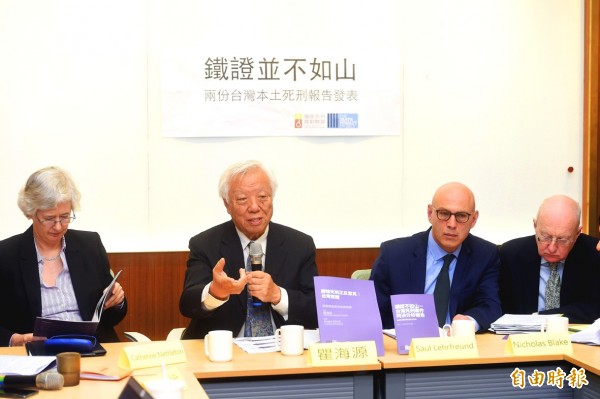《TAIPEI TIMES》 Poor knowledge underlines death penalty support: study

From left, British Representative to Taiwan Catherine Nettleton, Academia Sinica’s Institute of Sociology honorary professor Chiu Hei-yuan, Death Penalty Project executive director Saul Lehrfreund and retired judge of the High Court of England and Wales Sir Nicholas Blake attend a news conference yesterday in Taipei on abolishing the death penalty in Taiwan. Photo: Chien Jung-fong, Taipei Times
By Ann Maxon / Staff reporter
Newly published research found most Taiwanese have limited knowledge about the death penalty and have a shifting attitude toward its abolition, the Taiwan Alliance to End the Death Penalty and the UK-based Death Penalty Project said yesterday.
While the government has long procrastinated about abolishing the death penalty on the grounds that the majority of the public opposes it, a new report revealed a more complex picture, the alliance said.
The report, For or Against Abolition of the Death Penalty: Evidence From Taiwan, based on a survey conducted from 2013 to 2014, found that “members of the public have very limited knowledge about the practice of the death penalty in Taiwan and abroad, yet their knowledge affects whether they support abolition,” said Chiu Hei-yuan (瞿海源), an honorary professor at Academia Sinica’s Institute of Sociology who conducted the research.
Respondents were asked to answer four factual questions about the death penalty.
More than half, or 55 percent of the respondents, failed all four, while only 0.2 percent answered all of them correctly, he said.
While 88 percent of respondents oppose abolition, the number dropped to 82 percent if they were first asked questions about their trust in the judicial system and tested on their knowledge about the death penalty, he said.
Moreover, when given detailed scenarios to consider whether a defendant should be given the death penalty, respondents who support it dropped significantly.
For example, when asked if a poor man who accidentally killed a homeowner during a burglary should be sentenced to death, only 33 percent of respondents said “yes,” he said.
Instead of basing its policies on general public opinion, “the government should take a closer look into it and plan its policies based on a subtle understanding of public opinion,” he said.
Meanwhile, another report, entitled Unsafe Convictions in Capital Cases in Taiwan, conducted by University of Oxford professor Carolyn Hoyle, reviewed 62 cases of capital convictions from 2006 to 2015 and found 10 judgements to be “seriously flawed,” Death Penalty Project coexecutive director Saul Lehrfreund said.
Errors found in the cases include torture of suspects while in police custody, failure to collect and preserve evidence, and failure to establish an intent to commit murder, he said.
No matter how well-developed, resourced and sophisticated a criminal justice system may be, it cannot eliminate human errors, he said.
“Once the inevitability of error is accepted, the question is not whether an individual deserves to be sentenced to death and executed, but whether the state maintains the right to deprive an individual of the most basic human right, namely the right to life,” he said.
The reports show that public opinion on abolition is ever-shifting and never black-and-white, British Representative to Taiwan Catherine Nettleton said.
“Public opinion was used as an argument against abolition in the UK when it abolished it half a century ago, but today death penalty just does not come up as an option in the mind of a British person,” she said.
Hopefully, the reports would provide evidence for more objective discussion on abolition, she said.
“We firmly believe the death penalty should have no place in a democratic and human rights respecting society such as Taiwan,” she added.
新聞來源:TAIPEI TIMES
%http://www.taipeitimes.com/















